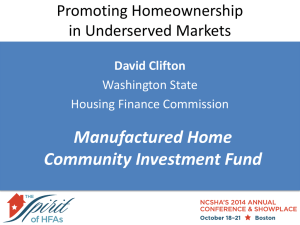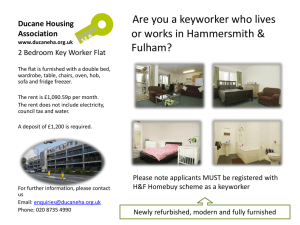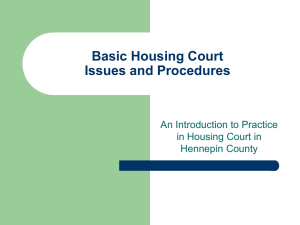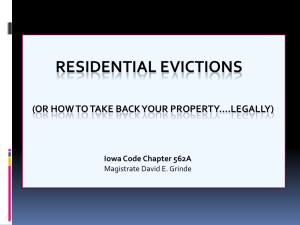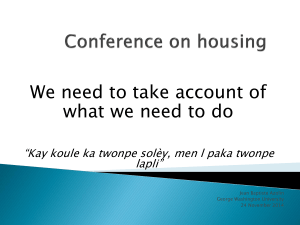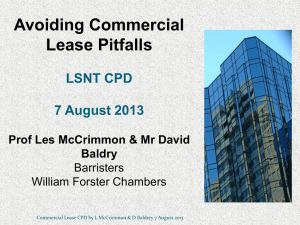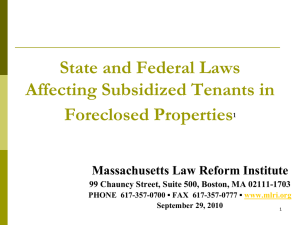Manufactured Housing Law in Pennsylvania
advertisement
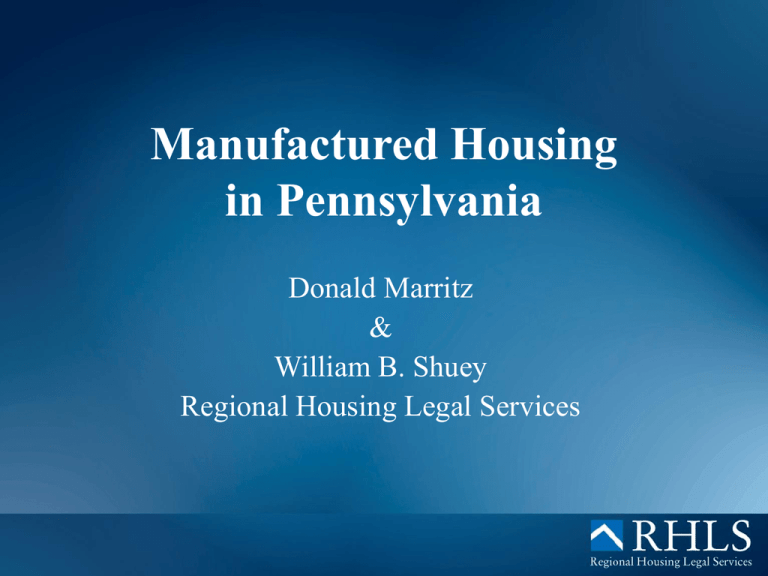
Manufactured Housing in Pennsylvania Donald Marritz & William B. Shuey Regional Housing Legal Services Agenda • About RHLS • Introduction to Manufactured Homes • Legal Framework – Manufactured Homes in PA • Other Resources RHLS Regional Housing Legal Services is a non-profit law firm with unique expertise in affordable, sustainable housing and its related components — community and economic development, utility matters and preservation of home ownership. RHLS provides innovative project and policy solutions that help create sustainable communities offering decent, safe and affordable housing for lower-income Pennsylvanians. RHLS Focus Areas • • • • • Development & preservation of affordable housing PA Housing Law Project PA Utility Law Project (PULP) Public Policy Initiatives Resident Protection Project – inform MH residents of their rights and how to protect and enforce them – help them purchase their communities, if possible – other states have statutes which make this possible – work with PLAN regional programs and Community Justice Project toward these ends Introduction to Manufactured Housing • What is a Manufactured Home? • Where are Manufactured Homes? • Who lives in Manufactured Homes? • Vulnerabilities of Manuf. Homeowners Manufactured Home Defined A Trailer Park: Manufactured Homes Are Not Mobile “Manufactured Home” is the official term for a home built according to 1976 HUD code. But many people still use the term “mobile home”, even though they are not mobile: • In Pennsylvania, nearly 55% have never been moved • More than 20% have not been moved in over 10 years • Mobility is not a factor for people who choose manuf. housing • A manuf. home is a long-term housing choice for most residents Industry Demographics • 11 manuf. housing plants in Pennsylvania – 60% of production shipped outside the state • Manufactured homes represented ~ 20% of housing starts in 2010 (DCED) • The industry employs ~12,000 Pennsylvanians • There are ~ 220 licensed retailers (dealers) (Information from PMHA) Where are Manufactured Homes Located? • Manufactured homes are mainly in rural areas of the state, where they are ~ 11% of the housing stock • Manufactured homes make up less than 5% of the housing stock in Pennsylvania as a whole. • 52% of homes in rural areas are on leased land • 31% are in manufactured home communities • Manufactured housing “will continue to be an important source of affordable housing in rural areas.” • Location - many are in a flood plain Who Lives in Manufactured Homes? - Age - • 69% are age 50 or older – – – – – – – 26% are in their 50s 21% are in their 60s 17% are in their 40s 14% are in their 70s 11% are in their 30s 8% are in their 80s 4% are in their 20s Who Lives in Manufactured Homes? - Income • ~ 80% have incomes under $50,000/year • ~ 65% have incomes under $40,000/year – – – – – – – 8% more than $75k 14% - $50k-75k 15% - $40k - $49,999 18% - $30k - $39,999 19% - $20k - $29,999 19% - $10k - $19,999 8% - less than $10k Who Lives in Manufactured Homes? - Education • Varying educational backgrounds, but… • On the whole, fairly well-educated • 81% have a high-school education or more Who Lives in Manufactured Homes? • • • • • • About 500,000 people in PA. live in manuf. homes 1,800-2,400 MH communities in PA– no accurate census Most MH households consist of 2 adults More than 95% of residents are white 89% “very” or “somewhat” satisfied w/their housing itself Dislikes—home value depreciates, land insecurity, resident rights subject to community owner rules • Rents less on average than site-built housing but 1/3 of residents have debt on their home, in addit. to rent and utilities • What’s the bottom line - cheaper than stick-built? Titling of Manufactured Homes as Personal Property - 75 Pa.C. S. § 1140 • Manufactured homes are titled as vehicles—they are considered personal property, not real property • If a home is permanently situated on land owned by the homeowner, the title can be cancelled – 60% of homes are sited on private land • Status as personal property has an adverse effect on financing and interest rates, as well as resale value • Some MH sellers are also lenders • Some MH lenders “specialize in subprime lending” Taxation of Manufactured Homes as Real Property • Despite being personal property and titled as vehicles, homes are taxed as real estate • Community owner pays R/E tax on the land, and the resident pays a R/E tax on the home. • Combined with disadvantages of titling as a vehicle, many MH owners feel they get worst of both worlds in this regard Vulnerability of Homeowners in Manufactured Home Communities • MH homeowners face “unique vulnerabilities” due to – – – – – – – – having their homes on land owned by others the status of their homes as personal property social stigmas—income, education, home values siting issues – flood plain Unregulated rent increases - amount Unfair rules - inability to challenge w/o risking eviction Underinvestment in infrastructure (water, roads, utilities) Community sale or closure—forced relocation, loss of equity, expense of moving home, loss of home Why the MHCRA? • Community owners generally have “far greater bargaining power” than homeowners – Staley v. Bouril, 718 A.2d 283 (Pa. 1998) • Homeowners need “special protections” against – arbitrary evictions – unfair rules and regulations – retaliation – Malvern Courts v. Stephens, 419 A.2d 21 (Pa. Super. 1980) Legal Framework • Landlord-Tenant Act - 68 P.S. § 250.101 et seq. – – – – Establishes proper eviction notice and procedure Protects right to organize—“tenant organization” Protects right to have social and business visitors Sets community owner duties for common areas, facilities • Manufactured Home Community Rights Act – – – – – Limits legal grounds for eviction—good cause Establishes other resident rights Limits community rules – fair, reasonable, not arbitrary Requires disclosure of some information to some residents 68 P.S. § 398.1 et seq. MHCRA Definitions and Applicability • The definitions can be confusing • “Manufactured home community” is a site on which there are 3 or more manuf. home dwellings • “MH Resident”- An owner of a manuf. home who leases a space in a manuf. home community • “Lessee” – A person who rents a MH community space and is responsible for performance of the lease • The MHCRA does not apply to a person who merely rents a manuf. home in a MH community • ? Can such a person challenge community rules ? 68 P.S. § 398.2 Other Important Definitions • “Rent” – Ground rent for a manuf. home space – Some leases try to make all debts “rent” – can speed eviction process • “Service charges” – charges for utilities, trash removal, water and sewer, internet, cable, and all other utilities • “Occupant” - An individual who resides in a manufactured home, who is either a lessee or a manufactured home resident • “Designated Notification Recipient Lessee” – “A lessee who designates in the lease a specific lessee and address for the purposes of receiving all required notices with regard to the manufactured home leased space. Delivery by certified or registered mail to a lessee so designated shall be deemed sufficient for purposes of this act.” 68 P.S. § 398.2 Evictions - Grounds • • • • A MH community owner may evict a resident or not renew the lease only for one of the following reasons: Non-payment of rent A second or subsequent violation of community rules within a 6-month period Change in use of the community or part of it Termination of the community or part of it 68 P.S. § 398.3 The End of the Lease Term is Not a Ground for Eviction • The owner of a MH community “shall not be entitled to recovery of a space upon the termination of a lease regardless of the term of the lease if the resident”: – is complying with the rules of the community – is paying the rent due, and – desires to continue living in the community 68 P.S. § 250.501 (c.1), (c.2) Limited grounds for recovery of a manufactured home space The only basis for recovery of a space shall be: • Legal eviction under § 3 of the MHCRA, 68 P.S. § 398.3 - non-payment of rent, violation of rules, changes in use/termination of community • When the owner and resident mutually agree in writing to the termination of a lease • At the expiration of a lease, if the resident no longer desires to live in the community and so notifies the owner in writing • Cole v. Czegan, 722 A.2d 686 (Pa. Super. 1998) (noting these important, non-retroactive statutory changes) Pre-eviction procedure – General 68 P.S. § 398.3(b) • Prior to the commencement of any eviction, or the termination of or failure to renew a lease, the community owner must give the homeowner a written notice • Notice must describe “particular breach or violation” • Notice must be served by certified/registered mail • Notice is a warning or opportunity to cure • Notice says that if rent isn’t paid or if further violation of rules, then an eviction may be commenced • MHCRA specifically prohibits self-help eviction Eviction Procedure in Case of Non-payment of Rent • MHCRA-pre-suit notice- eviction may occur if rent not paid – within 20 days from service, April 1 – Aug. 31 – within 30 days of service, Sept. 1 – March 31 – or, if there is an additional instance of nonpayment w/in six months of giving the notice • LT-Act – If no rent cure within the times set out above, NTQ says that tenant “shall remove” – within 15 days from service, April 1 – Aug. 31 – within 30 days of service, Sept. 1 – March 31 – service—personal, posting, leaving at principal building • Right to pay and stay - MDJ Rule 518 - in a case of recovery of possession solely because of failure to pay rent - pay rent actually in arrears and the costs of the proceedings. 68 P.S. §398.3(b)(2)(i); 68 P.S. §250.501(c), (c.1) Eviction Procedure in Case of Violations of Community Rules • • • • Notice of rule violation under the MHCRA Service - certified or registered mail Content - notice shall describe the particular violation No eviction may be commenced or lease terminated or refusal to renew lease, unless – notice of violation has been properly given, and – homeowner has again violated the community rules within six (6) months of the first notice • Malvern Courts - “absent literal compliance with mandatory provisions of this act [the MHCRA], no eviction proceedings may be commenced.” 68 P.S. § 398.3, 68 P.S. § 250.501(c) Improper Service of Notice of Rule Violation is a Defense to Eviction Malvern Courts, Inc. v. Stephens, 419 A.2d 21 (Pa. Super. 1980) • Court stressed the notice provisions in relation to the importance of preventing arbitrary evictions • Held: Statutory method of giving notice is exclusive, even if there is proof that resident got actual notice • Reasons for strict requirement concerning service – determine if reason for eviction is valid – time to cure default or avoid further rule violation – fix the 6-month period for 2nd rule violation • “Absent literal compliance with mandatory provisions of this act, no eviction proceedings may be commenced.” • Improper service of LT - NTQ under 68 P.S. § 250.501 may be defense to eviction – Pakyz v. Weiser (C.P. Adams) Eviction Procedure for Violation of Community Rules (cont.) • L-T Act eviction proceeding must be started w/in 60 days of last violation - Davis v. Ellis (C.P. Bedford 2007) • ? Must first notice include a warning about the effect of a second rule violation that occurs within 6 months? • ? Must the second violation be of same rule as first? • ? Must owner give written MHCRA notice of 2nd violation? • Owner must give LT - NTQ before starting eviction – 30-day notice for leases of less than one year or indeterminate time – 3-month notice for leases of one year or longer • ? Is refusal to sign a new lease a ground for eviction where resident pays rent and obeys rules Both Notice of Rule Violation or Unpaid Rent and Notice to Quit Are Required. • • • • • • • • Notice of unpaid rent gives opportunity to cure Notice of rule violation is warning not to violate a 2nd time Both of these MHCRA notices are conditional A conditional notice cannot terminate a leasehold interest— Brown v. Brown, 64 A. 2d 506 (Pa. 1949) Notice periods in L-T Act and MHCRA conflict. They must be construed to give effect to both, 1 Pa. C.S. §1933 Notice under L-T Act is an unconditional notice of intent to sue because of continuing or further violation No waivers – MHCRA §398.12 – No party’s rights may be waived by any provisions of a written or oral agreement But see, Adams v. Palmyra Homes – L-T Act doesn’t apply(?) Other Defenses to Eviction Unequal treatment • “All rules or rental charges shall be uniformly applied” to all residents “of the same or similar category” – 68 P.S. § 398.4(b) • A resident “shall not be evicted. . .when there is proof that the rules the lessee is accused of violating are not enforced with respect to” others - 68 P.S. § 398.3(c) • Charging same rent for lot ½ size of most others held not to violate the MHCRA. Midway Terrace, Inc. v. Foley, 635 A.2d 191 (Pa. Super. 1993). Other Defenses to Eviction Unfair or Unreasonable Rules • Community owner can establish rules – at any time – they must be fair and reasonable – related to health, safety, upkeep of community • Provided that, the rules are – not arbitrary or capricious – included in the written lease – delivered to existing lessees – given to new lessees before acceptance of deposit/rent – posted in the community in conspicuous and readily accessible place • ? Effect of improper/no posting/not in lease? • ? How can a resident challenge rules without risking eviction? 68 P.S. §398.4 Other Defenses to Eviction Unfair or Unreasonable Rules • Semack v. Fiumara – 47 D & C 3d 440 (C.P. Beaver 1987) – Rule that all vehicles must be registered and in running condition held to be reasonable • Nuss Home Park v. Breiner, 2003 WL 25460454 (C.P. Lehigh) – It was reasonable to limit occupancy to single families and require that names of all occupants be provided • Adams v. Palmyra Homes, Inc. (C.P. Lebanon 2011)– Requiring switch from oil to propane heat was “arbitrary,” absent factual basis for safety concerns Retaliatory Eviction Prohibited 68 P.S. § 398.16 • Action by community owner to – recover possession or change a lease – within 6 months of lessee’s assertion of rights under the Manuf. Home Community Rights Act – shall raise a rebuttable presumption that the owner’s action is retaliatory and unlawful Do Drug-Eviction Statutes Apply to Manufactured Home Communities? • Art. V-A of L-T Act, 68 P.S. § 250.505-A, provides for eviction for illegal drug violations • Question: Is this basis for eviction excluded because of L-T Act exclusive list of grounds for eviction? (“The only basis for recovery shall be. . . .” • Drugs not listed - expresio unius, exclusio alterius • Is MH resident a “tenant” under Expedited Eviction of Drug Traffickers Act, 35 P.S. §780-151 et seq.? • It seems likely that a court would allow eviction for drug violations or offenses 68 P.S. § 250.505-A Implied Warranty of Habitability Staley v. Bouril, 718 A.2d 283 (Pa. 1998) • There is a limited implied warranty of habitability (IWH) for MH residents leasing spaces in a MH community • The IWH exist to the extent that the community owner provides utilities or other housing services • IWH and resident oblig. to pay rent are mutually dependent • Material breach by one relieves other’s obligations • Resident must give notice of defect to owner/operator • Owner has reasonable time to cure • “Far greater bargaining power” of owner recognized • Remedies—repair & deduct, withhold rent, rent abatement, terminate lease—Pugh v. Holmes • Intentional infliction of emotional distress may apply in IWH case—Fair v. Negley, 390 A.2d 240 (Pa. 1978) Limit on Frequency of Rent Increases 68 P.S. §398.4.1(b) • Only once every 12 months • But no limit on amount of rent increase • There have been some “rent justification” bills, but very strong resistance from the industry New, renewed or extended lease which increases rent or other payables 68 P.S. § 398.13(e) • Community owner must give 60 days’ notice of intent to offer such a lease with increased rent • Resident then has 30 days to either accept new lease or notify owner of intent to vacate w/in 30 days • Resident who “chooses not to enter into” new lease “shall have 60 days from date of notification of intent to vacate. . .to enter into contract to sell or to relocate the manufactured home.” MHCRA – Disclosures 68 P.S. § 398.6, § 398.13(b) • Written disclosure required, prior to signing lease, of – all rent and other charges payable to owner, and – notice of utility charges for which resident is responsible • Failure to disclose makes charges “void and unenforceable” until disclosure made • Fee increases are unenforceable until 30 days after notice of increase is posted • A rental agreement for a first-time lessor is voidable if required disclosures are not given prior to execution of the agreement or prior to initial occupancy, during 1st year of occupancy, until 5 calendar days after disclosure given MHCRA – More Disclosures 68 P.S. §398.6(e)(8) • More extensive disclosures are required for leases which are for more than a 60-day period, including: – – – – manner in which lot rent will be increased factors that may affect amount of lot rent rent history for the past 3 years history of utility payments for the previous 12 months • But default lease term is 30 days, so few if any MH residents get these more detailed disclosures • Current efforts to amend the MHCRA and fix this, but… • “Calculation of rent history shall be posted” in public, conspicuous, readily accessible place, in same place as all other rules and regulations • Question: does “calculation of rent history” = “rent history”? MHCRA – Other Important Rights • Right to sell one’s home in place, subject to reasonable approval of new resident by owner • Does giving community owner a right of first refusal violate this provision? • No exit/entrance fees, appliance installation or removal fees, unless there are actual costs • Written lease required – 30-day is default, unless otherwise agreed • Is written lease any benefit to a resident? 68 P.S. §§ 398.11, 398.10, 398.8, 398.7, 398.4.1 Right to social and business visitors, purchase goods and services • Manufactured home community is a “multiple dwelling premise” (MDP) – 68 PS § 250.501-A(3) • MDP tenants have the right under 68 P.S. § 250.504-A to – have social guests and visitors—for reasonable period – invite bus. visitors, tradesmen, suppliers of goods/services – buy goods/services from source of resident’s choosing • Community owner may not charge fee or additional rent for any of these things – 68 P.S. § 398.10, 68 P.S. § 250.504-A • “These rights may not be waived”-68 P.S. § 250.504-A • Community owner cannot require purchase of exterior equipment from a designated supplier, 68 P.S. § 398.5,- Adams v. Palmyra Homes, supra. Tenant Organizations • A lease cannot be terminated or not renewed because of participation by tenant or member of the tenant’s family in a “tenant organization.” 68 P.S. §250.205 • A “tenant organization” is a group of tenants organized for any purpose directly related to their rights or duties. 68 P.S. § 250.102 • A tenant who individually seeks to induce or deter action by his or her landlord is not protected by the statute. Mid-Island Properties, Inc. v. Manis, 570 A.2d 1070 (Pa. Super. 1990) No Waiver of Rights or Duties 68 P.S. §398.12 • Rights and duties of manuf. home community owners, operators, and residents may not be waived by any provisions of a written or oral agreement. • “Any such agreement attempting to limit those rights shall be void and unenforceable.” • In spite of this, many MH leases contains waivers of rights, e.g., notice to quit, right to sell home in place • Question: What are a tenant’s options when a lease contains unlawful provisions? • L-T Act, 68 P.S. §250.250.501(e), permits shorter or entire waiver of L-T Act Notice to Quit – How can the MHCRA and L-T Act provisions be reconciled? Prohibition Against Retaliation for Assertion of Rights • Any action to recover possession or change the lease • Within 6 months of a resident’s assertion of rights – under the MHCRA – or any other legal right • • • • Shall raise a presumption That such action is a retaliatory and unlawful eviction And is in violation of the MHCRA The presumption is rebuttable by competent evidence 68 P.S. §398.16 Rights under the Pennsylvania Constitution • Right of free communication of thoughts, opinions– Every citizen may freely speak, write, and print on any subject – Art. I, sec. 7 • Right of citizens to peaceably assemble for their common good, and to apply to those invested with the powers of government for redress of grievances or other proper purposes, by petition, address or remonstrance – Article I, sec. 20 • Inherent rights of mankind – Article I, sec. 1 • Question—Do these rights apply as against private parties as well as the government? Are MH communities equivalent to a company town, as in Marsh v. Alabama, 326 U.S. 501 (1946)? Enforcement of the MHCRA • Attorney General and District Attorneys have the (discretionary) power to bring actions to restrain acts prohibited by the MHCRA, where that would be in the public interest • AG “shall have the power and it shall be his duty to enforce the provisions of this act…” - discretionary? MHCRA private right of action for damages – for community owner, operator, or lessee – aggrieved by a violation of their MHCRA rights • Violation of MHCRA may be a violation of the Consumer Protection Law, 73 P.S. § 201-1, et seq. 68 P.S. § 398.14, 68 P.S. § 398.15, 68 P.S. §398.13 Other Laws May Also Apply • DEP and environmental regulations may apply to water treatment and sewage/septic systems • Some townships have codes that apply specifically to manufactured home communities • Other townships have general codes that apply to MH communities, e.g., private roads code Current Initiatives • Opportunity-to-Purchase legislation – HB 1767 – – – – – when community going to close or be sold example of New Hampshire and other states ROC-USA – funding PathStone – technical assistance provider PHFA demonstration project/grant—pre-development funds • More specific tenant rights to speak, organize • Rent justification • Statewide manuf. homeowners association Resources -1 • RHLS - http://rhls.org/practice-areas/policyinitiatives/manufactured-housing – PA case list – Unreported cases – Resident’s rights brochure • NCLC - http://www.nclc.org/issues/manufactured-housing.html • CFED - I’M HOME http://cfed.org/programs/manufactured_housing_initiative/im_h ome/ • Manufactured Home Owners Assn. of America http://www.mhoaa.us/ Resources - 2 • Aman and Yarnal, “Home Sweet Mobile Home? Benefits and Challenges of Mobile Home Ownership in Rural Pennsylvania,” Applied Geography 30 (2010) • Aman and Yarnal, “An Examination of Mobile Homes in Rural Pennsylvania,” Center for Rural Pennsylvania, http://rural.palegislature.us/Mobile_Homes09.pdf • Carter, et al., “Manufactured Home Community Tenants: Shifting the Balance of Power” (AARP Public Policy Institute, 2004), available at http://assets.aarp.org/consume/d18138_housing.pdf Questions? Comments? Regional Housing Legal Services Donald Marritz 717-334-0528 donald.marritz@rhls.org William B. Shuey 215-572-7300 x. 109 william.shuey@rhls.org www.rhls.org

